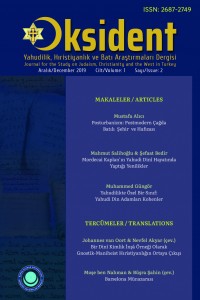Öz
Nowadays, local/regional history of the city which constitutes the memory of it, dynamic verbal reminiscences about its prominent figures and characters, its original local arts and micro-architecture, urban literature sticking every street in its memory by scanning each of them, its folklore that protects the original of the town and local policies enabling micro-municipality come to the forefront.
Post-urbanism, reflecting the concept of post-modern city points out to human beings with exalted identity, to a city with localness containing collective subjectivity and to the limits of belonging to a place with micron scales. If protecting the historical contexture and memory of the city as it is, is a modern concept; having critical perspectives to develop it with tools such as inspiration and intuition, and to update and elaborate it in accordance with the necessities of the age could be a postmodern one.
Anahtar Kelimeler
Kaynakça
- Carpo, Mario. “The Postmodern Cult of Monuments”. Future Anterior: Journal of Historic Preservation, History, Theory, and Criticism 4/2 (2007): 50-60.
- Ellin, Nan. Postmodern Urbanism. New York: Princeton Architectural Press, 1999.
- Giddens, Anthony. Central Problems in Social Theory: Action, Structure, and Contradiction in Social Analysis. Berkeley: University of California Press, 1979.
- Giddens, Anthony. Modernity and Self-identity: Self and Society in the Late Modern Age. Cambridge: Polity Press, 1991.
- Giddens, Anthony. The Consequences of Modernity. Cambridge: Polity in Association with Blackwell, 1990.
- Gotham, K. F. “Urban Sociology and the Postmodern Challenge”. Humboldt Journal of Social Relations 26/1-2 (2001): 57-80.
- Habermas, Jürgen. Theory of Communicative Action Vol. 2: Lifeworld and System. Çev. Thomas McCarthy, Cambridge: Beacon Press, 1987.
- Hicks, Stephen Ronald Craig. Explaining Postmodernism: Skepticism and Socialism from Rousseau to Foucault. New Berlin: Scholarly Publishing, 2004.
- Huizinga, Johan. Homo Ludens: A Study of the Play-Element in Culture. Boston: Beacon Press, 1955.
- Kalın, İbrahim. Barbar Modern Medeni. İstanbul: İnsan Yayınları, 2018.
- León, Bárbara Barreiro. “Urban Theory in Postmodern Cities: Amnesiac Spaces and Ephemeral Aesthetics”. Revista de Estudios Urbanos y Ciencias Sociales 7/1 (2017): 57-65.
- Lyotard, Jean François. The Postmodern Condition: A Report on Knowledge. Minneapolis: University of Minnesota Press, 1984.
- Macit, M. Hanifi & Alper İplikçi. Tarih Felsefesi. Ankara: Pegem Akademi Yayıncılık, 2017.
- Nas, P. J. M. “Congealed Time, Compressed Place; Roots and Branches of Urban Symbolic Ecology”. International Journal of Urban and Regional Research 22/4 (1998): 545-549.
- Phillips, Timothy R & Dennis L. Okholm. Christian Apologetics in the Postmodern World. Downers Grove, Illionis: InterVarsity Press, 1995.
- Rose-Redwood, Reuben v.dğr. “Collective Memory and the Politics of Urban Space: An Introduction”. GeoJournal 73/3 (2008): 161-164.
- Schmandt, Michael J. “The Importance of History and Context in the Postmodern Urban Landscape”. Landscape Journal 18/2 (1999): 157-165.
- Tarter, Jim. “Collective Subjectivity and Postmodern Ecology”. Interdisciplinary Studies in Literature and Environment 2/2 (1996): 65-84.
- Tucker, Kenneth H. “Aesthetics, Play, and Cultural Memory: Giddens and Habermas on the Postmodern Challenge”. Sociological Theory 11/2 (1993): 194-211.
- Wang, Fang. Beijing Urban Memory: Historic Buildings and Historic Areas, Central Axes and City Walls. Peking: Springer Publication, 2016.
Öz
Anahtar Kelimeler
Kaynakça
- Carpo, Mario. “The Postmodern Cult of Monuments”. Future Anterior: Journal of Historic Preservation, History, Theory, and Criticism 4/2 (2007): 50-60.
- Ellin, Nan. Postmodern Urbanism. New York: Princeton Architectural Press, 1999.
- Giddens, Anthony. Central Problems in Social Theory: Action, Structure, and Contradiction in Social Analysis. Berkeley: University of California Press, 1979.
- Giddens, Anthony. Modernity and Self-identity: Self and Society in the Late Modern Age. Cambridge: Polity Press, 1991.
- Giddens, Anthony. The Consequences of Modernity. Cambridge: Polity in Association with Blackwell, 1990.
- Gotham, K. F. “Urban Sociology and the Postmodern Challenge”. Humboldt Journal of Social Relations 26/1-2 (2001): 57-80.
- Habermas, Jürgen. Theory of Communicative Action Vol. 2: Lifeworld and System. Çev. Thomas McCarthy, Cambridge: Beacon Press, 1987.
- Hicks, Stephen Ronald Craig. Explaining Postmodernism: Skepticism and Socialism from Rousseau to Foucault. New Berlin: Scholarly Publishing, 2004.
- Huizinga, Johan. Homo Ludens: A Study of the Play-Element in Culture. Boston: Beacon Press, 1955.
- Kalın, İbrahim. Barbar Modern Medeni. İstanbul: İnsan Yayınları, 2018.
- León, Bárbara Barreiro. “Urban Theory in Postmodern Cities: Amnesiac Spaces and Ephemeral Aesthetics”. Revista de Estudios Urbanos y Ciencias Sociales 7/1 (2017): 57-65.
- Lyotard, Jean François. The Postmodern Condition: A Report on Knowledge. Minneapolis: University of Minnesota Press, 1984.
- Macit, M. Hanifi & Alper İplikçi. Tarih Felsefesi. Ankara: Pegem Akademi Yayıncılık, 2017.
- Nas, P. J. M. “Congealed Time, Compressed Place; Roots and Branches of Urban Symbolic Ecology”. International Journal of Urban and Regional Research 22/4 (1998): 545-549.
- Phillips, Timothy R & Dennis L. Okholm. Christian Apologetics in the Postmodern World. Downers Grove, Illionis: InterVarsity Press, 1995.
- Rose-Redwood, Reuben v.dğr. “Collective Memory and the Politics of Urban Space: An Introduction”. GeoJournal 73/3 (2008): 161-164.
- Schmandt, Michael J. “The Importance of History and Context in the Postmodern Urban Landscape”. Landscape Journal 18/2 (1999): 157-165.
- Tarter, Jim. “Collective Subjectivity and Postmodern Ecology”. Interdisciplinary Studies in Literature and Environment 2/2 (1996): 65-84.
- Tucker, Kenneth H. “Aesthetics, Play, and Cultural Memory: Giddens and Habermas on the Postmodern Challenge”. Sociological Theory 11/2 (1993): 194-211.
- Wang, Fang. Beijing Urban Memory: Historic Buildings and Historic Areas, Central Axes and City Walls. Peking: Springer Publication, 2016.
Ayrıntılar
| Birincil Dil | Türkçe |
|---|---|
| Bölüm | Makaleler |
| Yazarlar | |
| Yayımlanma Tarihi | 31 Aralık 2019 |
| Gönderilme Tarihi | 17 Haziran 2019 |
| Kabul Tarihi | 3 Ağustos 2019 |
| Yayımlandığı Sayı | Yıl 2019 Cilt: 1 Sayı: 2 |



